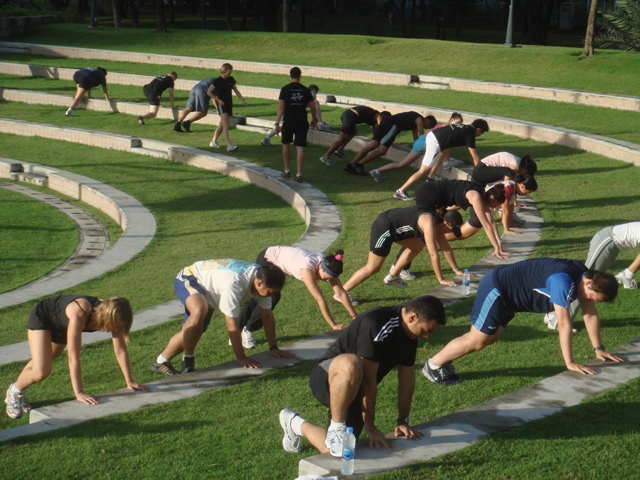When The Scales Wont Budge
If the weighing scales don't seem to move does it really mean I'm not losing any fat at all?
If body weight has not been lost it doesn't necessarily mean you're NOT losing any fat from stores.
We receive some emails explaining how dieters are exercising more and reducing calories but the scales don't seem move for weeks. There are a few reasons as to why this can occur, so let us explain a few of these in details to try and ease the mind.
1. As most people are aware when we first start any new exercise the muscles involved adapt over the first few weeks by becoming stronger, a strength increase often leads to a gain in muscle mass. It's possible to gain 2-3 pounds of lean weight within a few weeks without noticing any change in musculature. These new gains in lean mass can mask any loss in body fat, especially if you're only losing fat at a rate of 1-2 pounds per week. It's also possible that initial muscle gains could overtake any fat loss and the dieter sees the scales actually go up! This is one reason why weighing scales are NOT the best method to test weight loss results; it may be more accurate to check fat percentage by using fat monitors.
Realistically the dieter should keep to their workout schedule as any initial lean muscle gains will slow once muscles adapt to the exercise. At this point fat loss should begin to speed up because greater lean mass will increase the metabolism and enable the weight to start to reduce. Exercising to lose weight is king, so stick with a regular exercise plan!
2. Another change is an increase in blood volume. Hard working muscles need a greater supply of oxygen in order to maintain the work rate. Our body adapts by increasing the blood volume so a greater amount of oxygenated blood can be delivered to exercising muscles.
3. Regular exercise increases carbohydrate stores in the muscles (Glycogen) enabling the muscles to hold more energy for the next time you perform the exercise. Greater glycogen stores within the muscles causes the body to draw in more water to aid the storage; again this process will add some additional weight, although exactly how much depends on the type of exercise (anaerobic exercise tends to produce a greater Glycogen storage) and the present diet of the individual, specifically the carbohydrate intake. In theory however, if one is following a low calorie diet the carbohydrate intake may not be high enough to produce large glycogen storage.
4. Another consideration if the scales don't seem to be moving is you could be gaining back fluids lost from initial weight loss. When we lose weight it is inevitable that we will also lose some fluid ? caused by loss of muscle glycogen, protein / muscle loss or general fluid loss through sweating more - a gradual replacement of these fluids again could be masking any possible further losses in body fat stores.
Fat is actually a relatively light but dense source of energy. A fat loss of one pound is a huge loss of energy, as much as 3500 calories. For this reason losing fat will often take longer than the adaptations which occur to new exercise, so any exercise regime should be thought of as long term in order of months, NOT weeks. If the scales don't seem to be moving DO NOT worry or think you're wasting your time. Obtain exercise advice from a qualified instructor and stick to it. Every few weeks adjust the diet and/or tweak the exercise plan to burn more calories.
-
Group Personal Training
Personal Training is often just that, pe
-
6 things you need to do to Lose 20 pounds in 3-to-4 weeks
1. Get motivated to lose weight fast by saying So That Ask yourself
-
Effective Weight Loss For Todays Busy Lifestyle
The vast majority of people have busy lives nowadays, and fine tuning
-
Have Fun And Lose Weight At The Same Time
The varying advice offered for weight loss can make it difficult
-
Weight loss surgery more effective than diet and exercise
To maintain a healthy weight, medical professionals emphasize tha
-
8 Ways To Drop Weight Now
In this world that we live in there are
- DON'T MISS
- How To Exercise: Choosing the right type of exercise for you
- 5 Tips To Avoid A 10lb Christmas Weight Gain
- Don’t Be Fooled By These “Low Fat” Snacks
- Weight Loss Success Is Around The Corner With These Easy Tips
- Understanding The Common Causes Of Morbid Obesity And Treatment Options For The Morbidly Obese
- 5 Motivational Tips To Help You Lose Weight (Even If You Feel Like Giving Up)
- To Cleanse or Not To Cleanse; How to Keep Your Insides In Top Shape.
- Does Fat Free Really Mean Free Of Fat
- Homemade Weight Loss Shakes: What You Really Need To Know
- Could ankle weights help me get more out of my usual walking routine?




